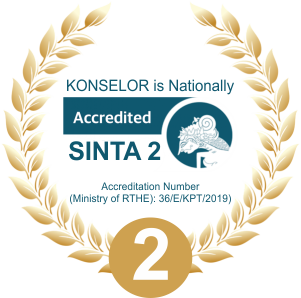The influence of identity development on multicultural counselling competencies of counsellor trainees
 ), Nor Mazlina Ghazali(2),
), Nor Mazlina Ghazali(2), (1) Universiti Malaysia Sarawak
(2) Universiti Malaysia Sarawak
 Corresponding Author
Corresponding Author
Copyright (c) 2019 Ng Kia Jee, Nor Mazlina Ghazali
DOI : https://doi.org/10.24036/0201983104420-0-00
Full Text:
 Language : en
Language : en
Abstract
References
Aga Mohd Jaladin, R. (2013). Barriers and challenges in the practice of multicultural counselling in Malaysia: A qualitative interview study. Counselling Psychology Quarterly, 26(2), 174-189.
Arredondo, P., Toporek, R., Brown, S. P., Jones, J., Locke, D. C., Sanchez, J., et al. (1996). Operationalization of the multicultural counseling competencies. Journal of Multicultural Counseling and Development, 24(1), 42-78.
Chaichanasakul, A. (2008). Examining multicultural counseling competencies among racial/ethnic minority and international psychological trainees. University of Missouri--Columbia.
Cross Jr, W. E. (1991). Shades of black: Diversity in African-American identity: Temple University Press.
D'Andrea, M., Daniels, J., & Heck, R. (1991). Evaluating the impact of multicultural counseling training. Journal of Counseling & Development, 70(1), 143-150.
Helms, J. E. (1997). Toward a model of White racial identity development. College student development and academic life: Psychological, intellectual, social and moral issues, 49-66.
Highlen, P. S. (1988). Self-Identity Development Model of Oppressed People: Inclusive Model for All?
Jamaludin, S. S. S., & Aloysius, M. (2019). A Malaysian Perspective on Traditional Chinese Medicine (TCM) During Postpartum Care and Its Relevance Towards China’s One Belt One Road Initiative (BRI) Silk Road to Belt Road (pp. 261-275): Springer.
Ladany, N., Inman, A. G., Constantine, M. G., & Hofheinz, E. W. (1997). Supervisee multicultural case conceptualization ability and self-reported multicultural competence as functions of supervisee racial identity and supervisor focus. Journal of Counseling Psychology, 44(3), 284.
Middleton, R. A., Ergüner-Tekinalp, B., Williams, N. F., Stadler, H. A., & Dow, J. E. (2011). Racial Identity Development and Multicultural Counseling Competencies of White Mental Health Practitioners. International Journal of Psychology & Psychological Therapy, 11(2).
Munley, P. H., Lidderdale, M. A., Thiagarajan, M., & Null, U. (2004). Identity development and multicultural competency. Journal of Multicultural Counseling and Development, 32, 283.
Myers, B. L. (1999). Working with the poor: New insights and learnings from development practitioners: World Vision.
Myers, L. J., Speight, S. L., Highlen, P. S., Cox, C. I., Reynolds, A. L., Adams, E. M., et al. (1991). Identity development and worldview: Toward an optimal conceptualization. Journal of Counseling & Development, 70(1), 54-63.
Ottavi, T. M., Pope-Davis, D. B., & Dings, J. G. (1994). Relationship between White racial identity attitudes and self-reported multicultural counseling competencies. Journal of Counseling Psychology, 41(2), 149.
Ping, V. S. (2017). The relationship between Malaysian counselor’s multicultural counseling competence and client satisfaction. MOJPC: Malaysia Online Journal of Psychology & Counselling, 1(1).
Pope-Davis, D. B., Reynolds, A. L., Dings, J. G., & Nielson, D. (1995). Examining multicultural counseling competencies of graduate students in psychology. Professional Psychology: Research and Practice, 26(3), 322.
Pope‐Davis, D. B., & Ottavi, T. M. (1994). Examining the association between self‐reported multicultural counseling competencies and demographic variables among counselors. Journal of Counseling & Development, 72(6), 651-654.
Ratts, M. J., Singh, A. A., Nassar‐McMillan, S., Butler, S. K., & McCullough, J. R. (2016). Multicultural and social justice counseling competencies: Guidelines for the counseling profession. Journal of Multicultural Counseling and Development, 44(1), 28-48.
Reynolds, W. M. (1982). Development of reliable and valid short forms of the Marlowe‐Crowne Social Desirability Scale. Journal of clinical psychology, 38(1), 119-125.
Ruelas, S. (2003). Objectively measured multicultural counseling competencies: A preliminary study. Handbook of multicultural competencies in counseling and psychology, 283-300.
Schmidt, W. C. (1997). World-Wide Web survey research: Benefits, potential problems, and solutions. Behavior research methods, instruments, & computers, 29(2), 274-279.
See, C. M., & Ng, K. M. (2010). Counseling in Malaysia: History, current status, and future trends. Journal of Counseling & Development, 88(1), 18-22.
Sevig, T. D., Highlen, P. S., & Adams, E. M. (2000). Development and validation of the Self-Identity Inventory (SII): A multicultural identity development instrument. Cultural Diversity and Ethnic Minority Psychology, 6(2), 168.
Vinson, T. S., & Neimeyer, G. J. (2000). The relationship between racial identity development and multicultural counseling competency. Journal of Multicultural Counseling and Development, 28(3), 177-192.
 Article Metrics
Article Metrics
 Abstract Views : 1420 times
Abstract Views : 1420 times
 PDF Downloaded : 359 times
PDF Downloaded : 359 times
Refbacks
- There are currently no refbacks.
Copyright (c) 2019 Ng Kia Jee, Nor Mazlina Ghazali

This work is licensed under a Creative Commons Attribution 4.0 International License.







